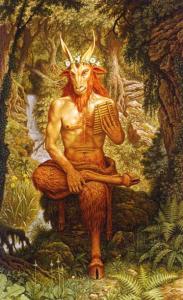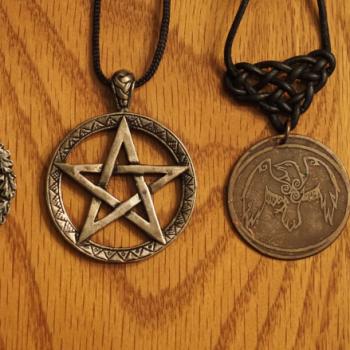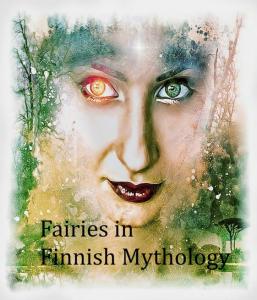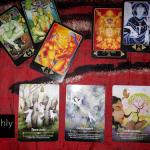
The roots of Valentine´s Day lead all the way to the pagan festival of Lupercalia in ancient Rome. Lupercalia was a festival dedicated to wolves and there are lots of stories about wolves in Roman mythology. Many of them come from Pre-Roman times. In the Etruscan culture, the wolf was worshipped as one of the most important totem animals.

Romulus and Remus
The most famous wolf legend is the story of Romulus and Remus. The two brothers founded the city of Rome. Their mother was a woman called Rhea Silvia who was a priestess in the temple of Vesta (later on she became one of the protector goddesses of the city of Rome). The Father of the brothers was Mars the god of war. Rhea Silvia had made an oath to remain a virgin and she could not tell anyone that she had given birth to twins. Legend tells that she put the children into a basket and took them to the river Tiber and left them there. The boys were found by the wolf goddess Lupa. She took them to her cave, which was called Lupercal and raised them like they were her own. One day Lupercus protector god of the shepherds leads one of the shepherds to Lupa´s cave. Shepard and his wife did not have any children of their own so they adopted the boys.

Lupercus
The name of the god Lupercus comes from the Latin word Lupus which means wolf. In Roman mythology, Lupercus can be seen as one of the personifications of the god Faunus who was the god of untamed and wild nature. In Greek mythology, his counterpart is the great god Pan. Lupercus was sometimes described as a man and sometimes as a wolf. In his human form, Lupercus wore wolf furs and goat skins. Lupercus was prayed by the shepherds so that he would not allow wolves to attack their herd.
Ceremonies were performed by priests called Luperci. These priests worshipped Lupercus as their patron god and their religious organization was known as the brotherhood of the wolf. In the ceremonies, goats and dogs were sacrificed. Goats represented the pastoral life and dog represented wolves. Festivities include music, singing and dancing. People dressed up in animal furs and wore wolf masks. Foremost Lupercalia was a festival where people celebrated their connection to the wolves and the wolf god. Little cakes which were baked by Vesta´s priestesses were thrown into the bonfire. It was believed that the scent rose into the skies and pleased the gods.
In ancient Rome, wolves had a dual role. Wolves were both feared and respected animals and many of their qualities were admired, like their hunting skills and the that they are very family-oriented animals. Lupercalia was celebrated to honour Lupercus and the wolves and also to celebrate Lupa the wolf mother of Romulus and Remus. Lupercalia can be translated as the festival of the wolf and it was celebrated on the 15th of February.
Around 300- 400 AD Christianity was spreading in the Roman empire. Leaders of the Catholic church did not approve of the festival which was all about celebrating humans’ connection to an animal. In 350 AD Catholic church turned Lupercalia into Valentine´s Day.
Story of St Valentine
There have been several saints who were called Valentine but the most famous legend tells about a priest who lived around the time of Emperor Claudius the second. The emperor strongly believed that married soldiers were the worst soldiers because they were always missing their wives so he forbid priests to wed soldiers. A priest named Valentine was rebellious and he secretly performed wedding ceremonies. According to the story Valentine was captured and many of the soldiers who he had wed, secretly brought him gifts and this started the Valentine´s Day gift-giving tradition. Valentine was executed in 269 AD. Almost a hundred years later when the Catholic church was putting a stop to Lupercalia. Valentine being canonized, the church started to spread, his legend and the 14th of February became St. Valentines Day.

Holiday of Hearts
St. Valentine´s Day has long traditions in Middle Europe and in South Europe. In England, the day of St.Valentine has been an official holiday since 1537. The idea of St.Valentine’s Day being a holiday that is purely connected to romantic love started in the Middle Ages by the Catholic church based on their teachings on monogamy.
First Valentine’s Day cards were printed in England in the 19th century. By then the holiday was losing its popularity in Europe until it was taken to the United States by immigrants. In USA Valentine´s Day became a huge commercial holiday and a gift for the marketing industry. This is when a red heart became the official symbol of Valentine´s Day and red and pink became its colours.
Some American Valentine´s Day traditions are Valentine’s Day ice skating and different kind of superstitions. According to one belief, the first person you will meet on the morning of Valentine’s Day is the love of your life. One of the symbols of Valentine’s Day is the Roman god Cupid who blindly shoots arrows and makes people fall in love. During Victorian times, the image of Cupid was changed from a handsome young man into an angelic chubby baby.

Valentine’s Day is celebrated in many ways in different countries and cultures. In my country, Finland Valentine’s Day is known as Ystävänpäivä the friendship day. Valentine´s Day arrived in Finland in the late 1980s and in 1987 it became an official holiday. Friendship Day in is also celebrated in Denmark and in Estonia. In Finland, Friendship Day is the second biggest holiday after Christmas when people send postcards and messages on social media to each other.
I´ve always liked the concept of Friendship Day because it goes beyond the idea of romantic love and covers love in all of its beauty. It is the time to remember all your friends and loved ones. Some of the friendship day traditions in Finland is to give cards and little gifts to your friends. You can remember your best friends, your partner, your parent, your grandparent or your favourite teacher. Any person who you consider as your friend.
















